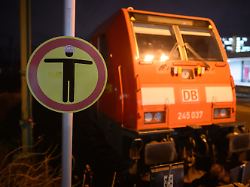Chancellor urges GDL to exercise moderation
Scholz rejects tightening the right to strike
January 23, 2024, 6:06 p.m
Listen to article
This audio version was artificially generated. More info | Send feedback
Against demands from the FDP and the Union for a tightening of the right to strike, Scholz affirms the GDL’s right to an industrial dispute. At the same time, the Chancellor appeals to train drivers to use this “wisely”.
Chancellor Olaf Scholz has rejected considerations of changing the law in view of the long strike by the train drivers’ union GDL. Germany has “very good constitutional law for good reasons,” said the SPD politician in Berlin. The right to form unions and lead industrial disputes “is one of the freedoms that are so firmly regulated in our Basic Law that they cannot simply be abolished, not even by law.”
At the same time, Scholz called on the GDL to exercise moderation: The rights enshrined in the constitution “did not prevent anyone from always making wise use of their opportunities, our rights.” That is his appeal.
The GDL strike at Deutsche Bahn begins this Tuesday at 6 p.m. in freight traffic, in passenger traffic from 2 a.m. Wednesday morning and ends on Monday at 6 p.m. With 144 hours in freight traffic and 136 hours in passenger traffic, this would be the longest GDL industrial action on the railway.
FDP and Union criticize Weselsky
The economic policy spokesman for the FDP parliamentary group, Reinhard Houben, had previously said: “If an agreement is not reached soon, we will have to discuss in politics how proportionality can be brought back into this industrial dispute.” CDU leader Friedrich Merz also put legal changes up for debate: The GDL industrial dispute shows “that our system of social partnership with collective bargaining autonomy only works if everyone involved moderates themselves,” he told the “Rheinische Post”. Otherwise, “the system is at risk.”
CDU General Secretary Carsten Linnemann and CDU politician Gitta Connemann had also criticized the fact that the train drivers’ strike was taking place without any attempt at mediation. “In critical infrastructure, an arbitration procedure must first be completed before a strike takes place,” said Connemann and called for it to be enshrined in law. “The employer comes with an offer and Mr. Weselsky says: I’m not even looking at it, or rather I’m not sitting at the table. Instead, there’s a strike for the fourth time. That’s not proportionate,” said Linnemann in the early start of ntv. If necessary, the federal government must appoint an arbitrator.
